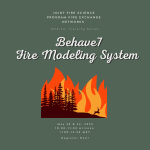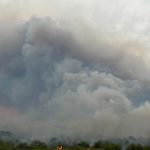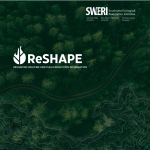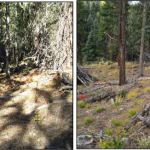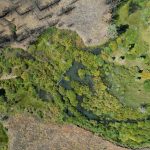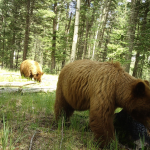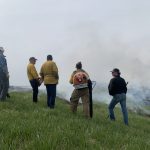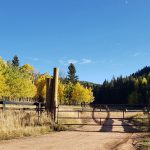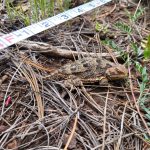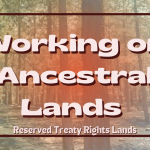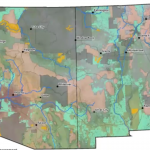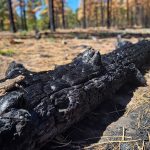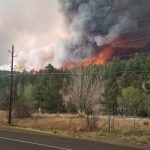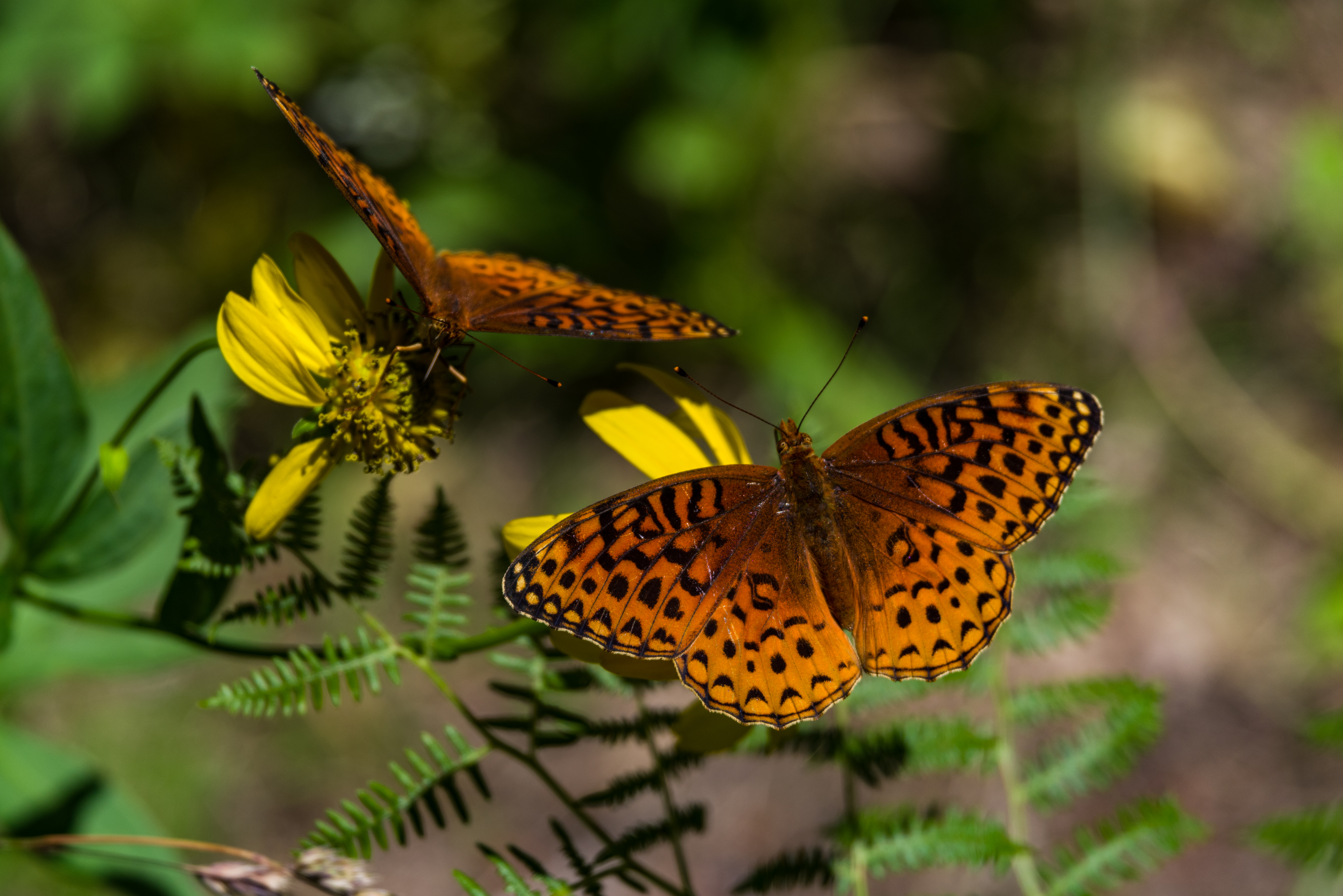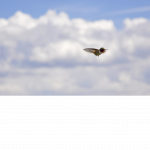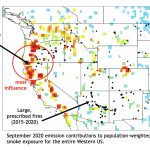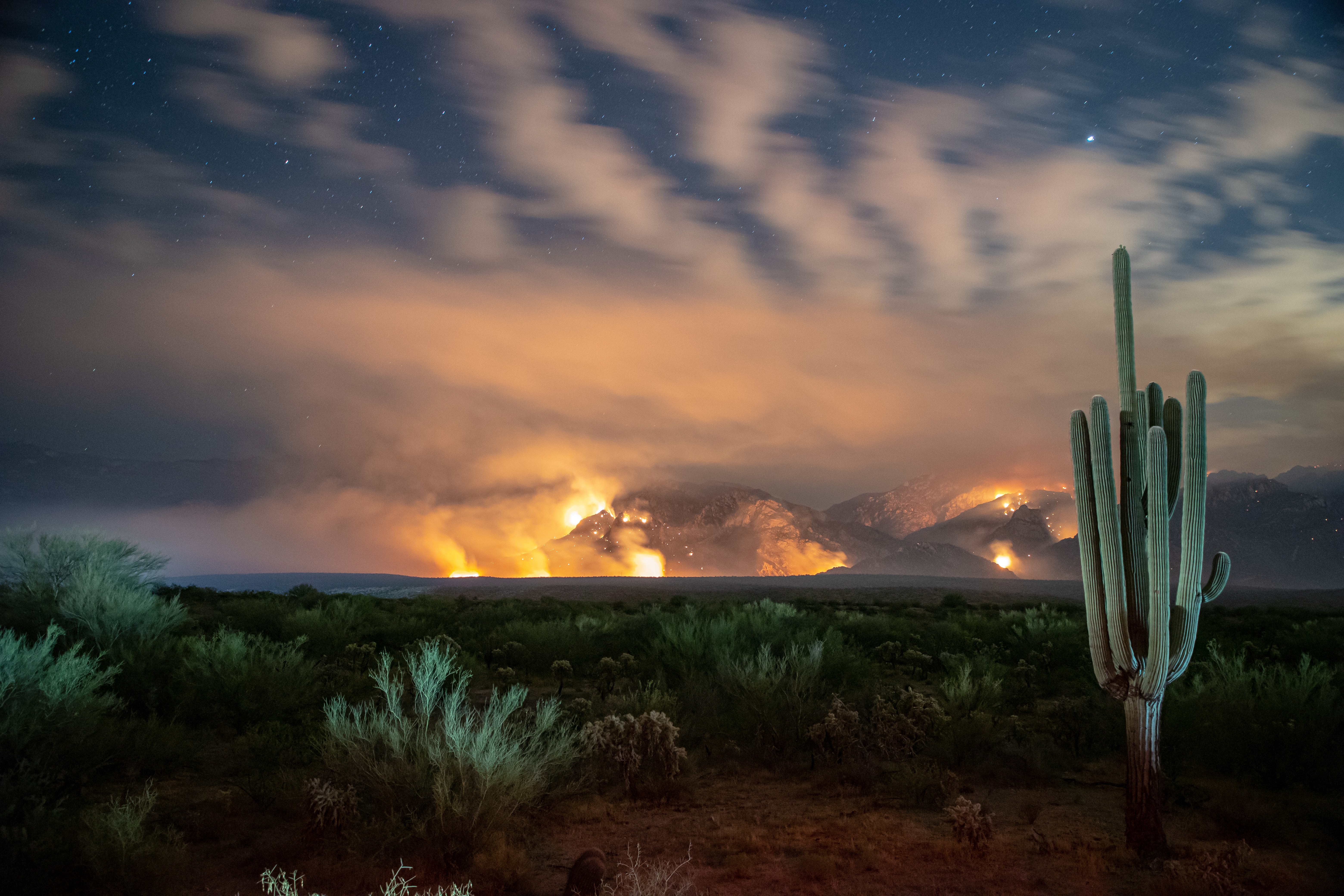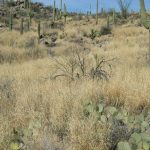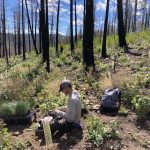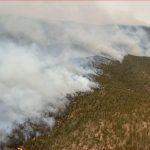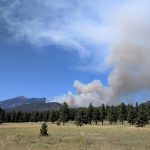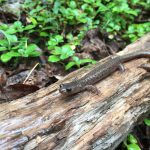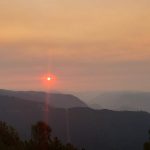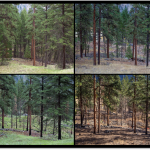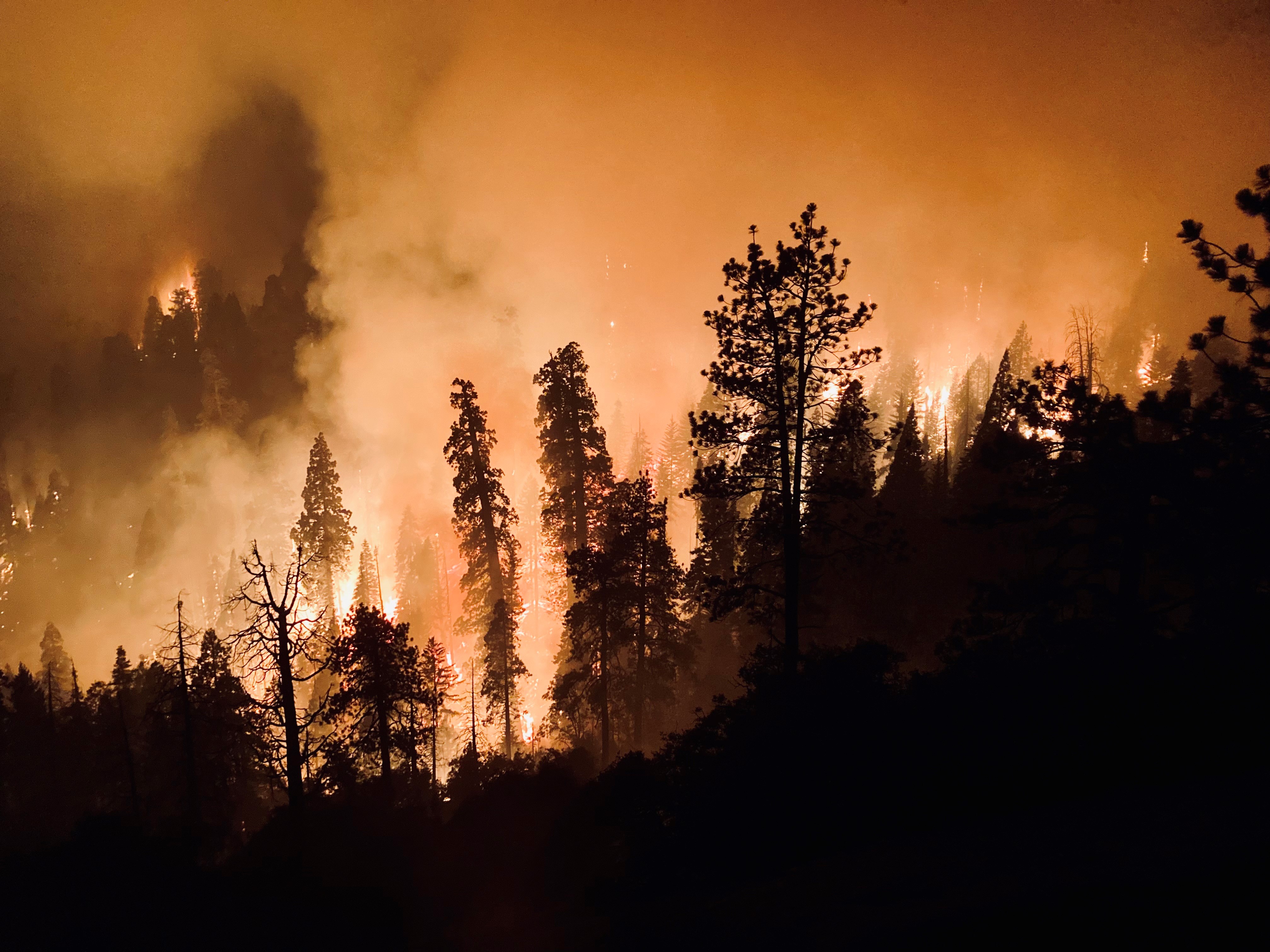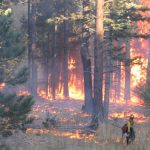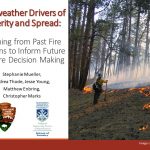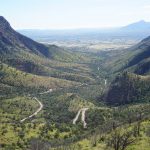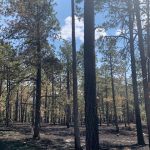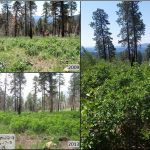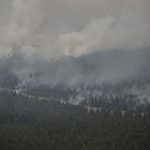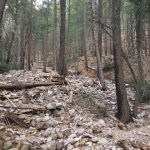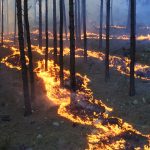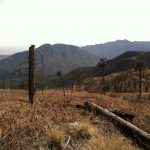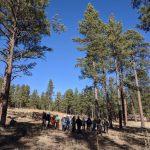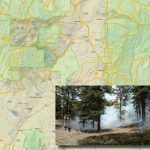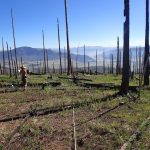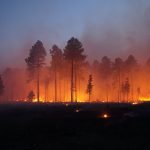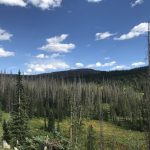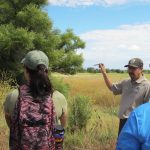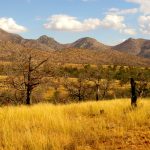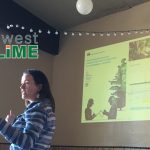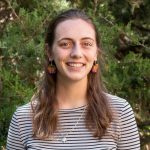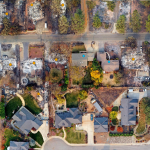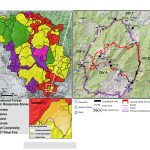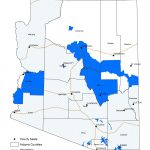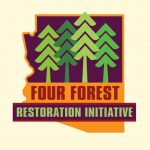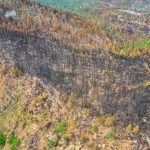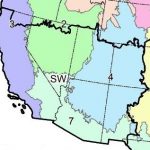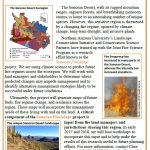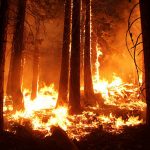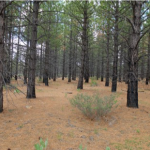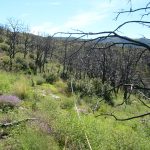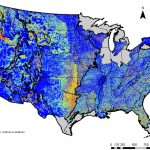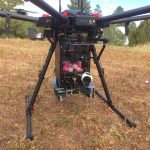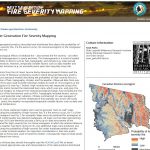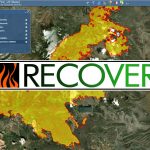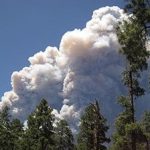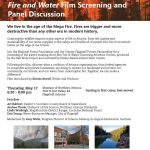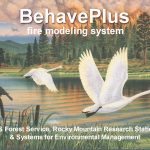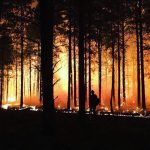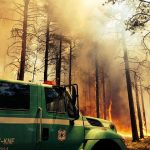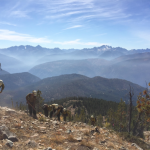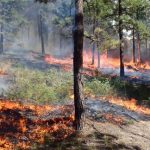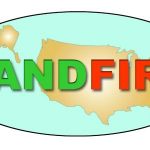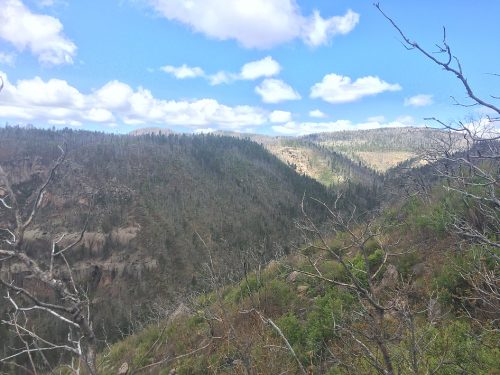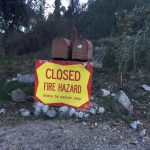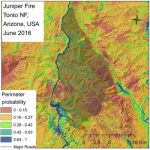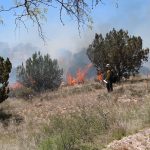Watch recordings of the latest in wildland fire science advancements & other topics
[searchwp_search_result_link direct=”true”]
[searchwp_search_result_excerpt] [/searchwp_search_results]Find recordings of all our webinars on our You Tube Channel @swfirescience.
How do Fire Managers use Information?: Developing Practical and Usable Weather and Climate Information for Southwest Wildfire Management
In a nutshell: Presenters from University of Arizona will discuss how wildland fire managers use decision support tools and how those weather and climate tools can be revised or reinvented to better fit managers’ needs. Date and time: Thursday, June…
On the Edge: Tree Growth and Resilience of Aspen and Chihuahua Pine in Saguaro National Park
In a nutshell: Presenters will discuss the reactions and resilience of two mesic and xeric species to climate variability in Saguaro National Park to consider what their adaptive patterns may look like under hotter and drier conditions in the near…
The Behave7 Fire Modeling System is here!
Recorded on: May 20, 2025 at 11:00-12:30 (fire analysts) and May 22, 2025 (prescribed fire planning) Description: These webinars are a two part series of trainings for the Behave Fire Modeling System. These webinars go over changes in version 7…
Fire in the Southwest: Fire season 2024 overview and 2025 outlook
In a nutshell: Learn about commonalities and unique events within the 10 largest Southwestern fires of 2024 and hear a meteorologist explore the fire season outlook and expectations for fire weather behavior in 2025. Recorded on: Thursday, May 1, 2025…
ReSHAPE: Reshaping wildfire and fuels reduction information
In a nutshell: Learn about the Treatment and Wildfire Interagency Geodatabase (TWIG), a geodatabase and viewer integrating nationwide federal—and soon state-level—fuel treatment and wildfire data, and how it differs from other decision support tools and explore its applications, through research…
A Long-Term View of Collaborative Forest Management: The 15-Year Southwest Jemez CFLRP Report
In a nutshell: Presenters from the Southwest Jemez Mountains CFLRP offer lessons gleaned from 15 years of cooperative work about the impact of managed and prescribed fire, forest thinning, and a collaborative approach to land management on landscape resiliency. Recorded…
Pre- and Post-Fire Impacts of Beaver Dams and Beaver Dam Analogs
In a nutshell: In a landscape with increasingly frequent severe wildfires, freshwater ecosystems are emerging as an important part of wildfire management. This presentation touches on the role of beaver dams and their analogs in creating wetlands, the nexus between…
The Bear Truth: Black Bear Resource Selection and Response to Wildfires and Forest Restoration Treatments
In a nutshell: This presentation provides valuable insights for managers seeking to reduce wildfire risk while maintaining or enhancing habitat for black bears or sympatric species in fire prone landscapes. Recorded on: Apr 9, 2025 at 10:00AM Pacific / 11:00…
Human Causes and Human Consequences of Wildfires in the Western United States
In a nutshell: Three webinars over three days explore conditions that contribute to wildfire ignitions, how preparation and response need to be tailored to fit the affected community, and how red flag warnings help reduce fire ignitions. Interdisciplinary understanding and…
Building Ecosystem Resilience & Adaptive Capacity: Aspen Ecology and Management in the Southwest
In a nutshell: Dr. Connor Crouch presents on three threats facing quaking aspen in the Southwest – climate, pests and disease, and livestock browse – and three management objectives and strategies that can be implemented to improve aspen resilience and…
Wildlife and Fire: Communication to Improve Wildlife Outcomes
In a nutshell: Panelists present real-world examples and lessons learned on the importance of effective and comprehensive communication within agencies, across functional areas, between organizations, and with members of the public to advance our understanding and improve outcomes for wildlife…
Wildlife and Fire: Understanding Landscape-Scale Impacts and Conservation Through a Single-Species Lens
In a nutshell: Panelists present various viewpoints and examples of how landscape-scale management can be understood through investigation of a single species. View the recording for research reviews, case studies, and stories about tribal forestry, jaguars’ adaptability to changing conditions…
Tribal Collaborations and Agreements: The Community Navigators Program (CNP)
This webinar has been cancelled for organizational purposes. We apologize for the change of schedule and inconvenience and hope to see you at the AZ Tribal Fire and Climate Resilience Summit to learn more about this topic Date and time:…
Working on Ancestral Lands: A primer on Reserved Treaty Rights Lands (RTRL)
In a nutshell: This presentation offers information on funding mechanisms, resources for, and how, where, and by whom the Reserved Treaty Rights Lands (RTRL) program can be accessed. Watch the recording to hear first-hand accounts of how RTRL is used…
A Primer on Tribal Forest Protection Act and 638 Authority
In a nutshell: This presentation offers information on the history and basics and presenter experience with two cross-boundary agreement tools available to Federally Registered Native American Tribes, the Tribal Forest Protection Act and 638 Authority. This sets the stage for…
Wildlife and Fire: Improving Habitat Management Through Monitoring and Adaptation
In a nutshell: Panelists discuss a variety of topics related to the impact of climate change, fire, and associated stressors on wildlife habitat management. Join us for research reviews, case studies, and stories about emerging monitoring technologies, management frameworks, and…
Fire in the Southwest – Fire Season 2023 Overview and 2024 Outlook
In a nutshell: Learn about commonalities and unique events within the 10 largest Southwestern fires of 2023 and hear a meteorologist explore the fire season outlook and expectations for fire weather behavior in 2024. Recorded On: June 4, 2024 Description:…
Wildlife and Fire: From Borders to Biota, Monitoring at Multiple Scales
In a nutshell: Panelists discuss a variety of topics related to wildlife and habitat monitoring at the intersection of fauna and environmental disturbances such as fire. Join us for research reviews, case studies, and stories about existing collaborations and technologies…
An Evolution in Thinking About Fire: A Panel Discussion
In a nutshell: This panel discussion reflects on fire management decisions made – and opportunities missed – during the San Juan National Forest’s 2023 fire season, and how those decisions represent an organizational evolution toward more nuanced and strategic thinking…
Wildlife and Fire Series
In January, the Southwest Fire Science Consortium, USDA Forest Service, Southwest Climate Adaptation Science Center, and many other partners hosted a two-day workshop on the intersection of wildlife and fire. Based on the needs identified in the workshop, this collaborative…
Wildlife and Fire: Perspectives and Effects
Webinar #1 of the Series Recorded on: April 9, 2024 Description: In January, the Southwest Fire Science Consortium, USDA Forest Service, Southwest Climate Adaptation Science Center, and many other partners hosted a two-day workshop on the intersection of wildlife and…
Post-Wildfire Recovery Through The Principles of Engineering with Nature
In a nutshell: Following a severe wildfire, recovery efforts can benefit from using “Engineering With Nature” principles to utilize existing materials on the landscape for slope stabilization, erosion control, and stream restoration. Learn about the successes and lessons learned with…
The REBURN Model: Simulating forest and fuel succession and disturbance dynamics of large landscapes
In a nutshell: This webinar discusses REBURN, a geospatial modeling framework designed to simulate reburn dynamics over large areas and long-time frames to investigate the impact of multiple fires in the same area. Recorded on: January 17, 2024 Presenters: Dr.…
Overview and Verification of LANDFIRE Fuels: 2022 Cooks Peak Fire
In a Nutshell: Learn more about how to use LANDFIRE. We’ll use the 2022 Cook’s Fire as a case study. Description: A practitioner-oriented overview of LANDFIRE with a focus on fuels and how they react to modeling techniques. The subject area of…
Prescribed Burns as a Tool to Mitigate Future Wildfire Smoke Exposure
In a nutshell: Can prescribed fire reduce future smoke impacts? Research on how targeted prescribed burn treatments in heavily forested Western states may have an outsized impact on improving air quality for the entire western U.S. by reducing the likelihood…
Grassification and Fast-Evolving Fire Connectivity and Risk in the Sonoran Desert
IN A NUTSHELL: In the second webinar in a series on invasive grass-driven changes in dry desert systems, presenters will discuss their findings on the fire dynamics of the 2020 Bighorn Fire in the Sonoran Desert near Tucson, AZ to…
Monitoring and Removal of Invasive Grasses for Restoration of Dry Desert Systems
IN A NUTSHELLA panel of researchers and managers discusses the impact of non-native invasive grasses on dry desert systems and various methods to remove, monitor, or slow their spread. The fire regime of dry desert systems, such as the Sonoran,…
Increasing Post-Wildfire Planted Seedling Survival
In a nutshell: Tips for planting trees after severe fire in the Southwest, we learn how microclimates, nurse plants, and biochar impact survival of seedlings. We also learn how these techniques can be scaled-up to improve replanting efforts across an…
Fire in the Southwest, Past and Present – Fire Season 2022 Overview and 2023 Outlook
In a nutshell: A researcher examines trends in the largest fires in the Southwest of 2022, and a meteorologist explores the fire season outlook and expectations for fire weather behavior in 2023. Description: Join the SWFSC for a webinar reviewing…
Public Experiences and Perceptions with Wildfire and Flooding, A Case Study of the 2019 Museum Fire
IN A NUTSHELL: Gain insights into public perceptions on wildfire and post-fire flooding with suggestions on how to improve information exchange. Description: The greater Flagstaff area in northern Arizona has experienced multiple wildfires in recent years that have resulted in…
Policy & Managed Fire
IN A NUTSHELLReview of the history, policies, and challenges behind “managed wildfire”, the fire management strategy of leveraging natural ignitions for resource objectives and community benefit. Description: The topic of “managed wildfire” is mired in complexity, starting with what to call…
Fires, forest management, and the future of New Mexico’s endemic salamanders
In a nutshell: Case study showcasing land management strategies that seek to reduce wildfire-associated impacts on two endemic threatened or endangered salamander species in the Jemez Mountains of New Mexico. Date: Thursday, March 30 at 10am Mountain Time/ 9am Arizona Time…
Strategies to Reduce Wildfire Smoke
In a nutshell: This webinar will address what could be done to reduce the amount of smoke experienced by frequently impacted communities during wildfire season. Description: Smoke from wildfires is a well-recognized public health and safety issue. While there have…
Wildfire and Climate Change Adaptation
IN A NUTSHELL Experts tell the story of forest change since colonization, and share insights and answer questions about how we might steward a legacy of forest change and mitigate climate change impacts. Description: Climate change and wildfires pose an…
Geomorphic Recovery and Post-Fire Flooding Implications from Museum Fire
Research on post-fire debris flows and geomorphology of Museum Fire, Flagstaff, AZ with implications across the Southwest.
Nighttime Fire
Presenter: Patrick H Freeborn, PhD, Research Physical Scientist with the USDA Rocky Mountain Research Station Date: December 6, 2022 at 12 MDT Wildfire activity typically subsides sufficiently enough at night to provide firefighters with opportunities to rest and recover. However,…
Vegetation Type Conversion
Presenter: Christopher H. Guiterman, Research Scientist at the Cooperative Institute for Research in Environmental Sciences (CIRES) at the University of Colorado Boulder and NOAA’s National Centers for Environmental Information (NCEI) Date: September 21, 2022 at 12:00pm AZ / 1:00pm MDT…
Post-Fire Logging
Presenter: Camille Stevens-Rumann, Assistant Professor of Forest and Rangeland Stewardship at Colorado State University Date: August 31, 2022 at 12:00pm AZ / 1:00pm MDT Following a wildfire, successful tree regeneration is mediated by multiple factors, from the microsite to landscape…
Wildfire, Human Health, and Environmental Justice
Presenters: Savannah D’Evelyn, Postdoctoral Fellow with the University of Washington, Department of Environmental & Occupational Health Sciences and Ed Smith, Terrestrial forest Ecologist with The Nature Conservancy’s California Program. Date: July 19, 2022 11am AZ / 12pm MDT Increasing wildfire…
Protecting Denver’s Water Supply
Presenter: Dr. Kelly Jones, Associate Professor of Ecological Economics with Colorado State University, Human Dimensions of Natural ResourcesDate: June 22, 2022 11am AZ/12pm MDT Collaboratively-funded fuel treatments are becoming more common in the western U.S. to proactively address wildfire impacts.…
Outdoor Recreation & Wildfire
Date: May 10, 2022 11am AZ/12pm MDTPresenter: Adam Benefield, CTC Technology and Energy Federally owned public lands, originally designated to properly manage natural resources, are prone to wildfire in the southern Rocky Mountains, a risk which has increased as a…
Collective Action for Wildfire Risk Reduction
Date: April 19, 2022 11am AZ/12pm MDTPresenter: Dr. Susan Charnley, Pacific Northwest Research Station Over the past decade, government policies and programs to incentivize “all-lands approaches” to reducing wildfire risk have emerged that call for collective action among diverse public,…
Managed Wildfire
Date: March 23, 2022 11am AZ/12pm Mountain DaylightPresenters: Stephen D. Fillmore, PhD Student, University of Idaho, Dr. Sarah McCaffrey To improve understanding of the managed wildfire decision-making process on federal lands (USA), we conducted a mixed methods review of the…
Wildfire, Fish, & Water Resources in the Western US
Presenter: Dr. Patrick Belmont, Utah State UniversityDate: February 15, 2022 12pm Mountain Wildfire has increased 20-fold in the last 30 years in the Western U.S., partly due to climate change and partly due to forest and fire management practices. At…
Postfire Management in Frequent-Fire Conifer Forests
Presenter: Dr. Jens T. Stevens, National Program Lead for the Wildland Fire and Fuels Research, USDA Forest ServiceDate: January 19, 2022 12pm Mountain Standard Time The increasing incidence of large wildfires with extensive stand-replacing effects across the southwestern United States…
Full-Cost Accounting of the 2010 Schultz Fire
Presenter: Dr. Melanie Colavito, Ecological Restoration Institute, Northern Arizona University; Dr. Catrin Edgeley, Northern Arizona University; and Dr. Evan Hjerpe, Conservation Economics InstituteDate: December 7, 2021 12pm Mountain Time The 2010 Schultz Fire was ignited by an abandoned campfire on…
First Nations Wildfire Evacuations: A Guide
Presenter: Dr. Henok W. Asfaw, Postdoc and Project Manager for the First Nations Wildfire Evacuation Partnership Project, University of AlbertaDate: November 18, 2021 12pm Mountain Time In this presentation, we will present results of research carried out as part of…
Repeat Photography and Post-Fire Ecosystem Change in SE Arizona
Date: October 26, 2021 1pm AZ/2pm MDTPresenters: Jim Malusa, University of Arizona, with an introduction by Don Falk, University of Arizona While making a vegetation map of the Chiricahua Mts in 2010, I took georeferenced photos and notes on the…
Tool for Understanding Human-Nature Relationships for Wildland Fire Management
Presenter: Chris Armatas, Research Social Scientist, Forest Service & Aldo Leopold Wilderness Research InstituteDate: September 23, 2021 11am AZ/12pm MDT Wildland fire is a phenomenon that impacts people and communities from the local to the national scale. These impacts are…
Can landscape fuel treatments enhance both protection and resource management objectives?
Date: September 14, 2021 11am AZ/12pm MDTPresenter: Kevin Vogler, Pyrologix LLC, Missoula Montana Land management agencies in the U.S. Departments of Interior and Agriculture can potentially accomplish ecological resource management objectives using unplanned wildfires, but only if such fires do…
Land Use Planning as a Strategy for Fire Adapted Communities
Presenter: Molly Mowery, AICP, Executive Director, Community Wildfire Planning CenterDate: August 26, 2021 11am AZ/12pm MDT As communities across the U.S. face increasing threats from wildfire, there is also a growing interest in land use planning as a strategy to…
Fire-weather Drivers of Severity and Spread: Example from Grand Canyon
Presenter: Stephanie Mueller, Northern Arizona UniversityDate: July 29, 2021 11am AZ / 12pm MDT Fire is an essential component in restoring and maintaining a healthy forest. However, historic land use and decades of fire suppression has excluded fire from millions…
Transboundary Management & Fire Regimes of Bi-National Sky Islands
Presenter: Miguel Villarreal, Western Geographic Science Center, USGSDate: July 20, 2021 11am AZ/12pm MDT In this webinar I will share results of a recent study of contemporary fire regimes over a 32-year period (1985-2017) in the Madrean Sky Islands of…
Doing Work on the Land of Our Ancestors: Reserved Treaty Rights Lands Collaborations
Presenters: Greg Russell, Colorado State University; Mike Martinez, Pueblo of Tesuque; Alan Hatch, Santa Ana PuebloDate: May 6, 2021 11am AZ/12pm MDT This webinar considers the Reserved Treaty Rights Lands (RTRL) program and how it has been used to implement…
Restoration Treatments: Reducing Fuels and Increasing Understory Diversity
Presenters: Mike Stoddard, Ecological Restoration Institute and Matt Tuten, USDA Forest ServiceDate: Thursday April 15, 2021 11am AZ/12pm MDT This webinar will share research on forest structure and understory vegetation responses to three restoration treatments (thin/burn, burn, and control) over…
Indigenous Fire Management & the WUI
Date: March 4, 2021 12pm Mountain/1pm CentralPresenters: Chris Roos, Southern Methodist University; Chris Toya and John Galvan, Jemez Pueblo As residential development continues into flammable landscapes, wildfires increasingly threaten homes, lives, and livelihoods in the wildland–urban interface (WUI). Although this…
The Fire x Post-Fire Double Double Emergency
Date: Wednesday February 10, 2021 2:30-4pm Mountain Time This webinar brings together a panel of postfire response experts to reflect on their experiences in addressing community needs during recent large fires. The discussion highlighted important differences in fire and postfire…
Prescribed Fires & Fire Regimes
Presenter: Dr. Molly Hunter, USGS SW Climate Adaptation Science Center, Research Manager / Joint Fire Science Program, Science AdvisorDate: January 28, 2021 12pm MST Prescribed fire can result in significant benefits to ecosystems and society. Examples include improved wildlife habitat,…
East Jemez Landscape Futures
Date: December 15, 2020 12pm Mountain Time The East Jemez Landscape Futures (EJLF) project is a collaborative, landscape-scale approach to help guide future planning and research efforts in the severely altered landscapes of the eastern Jemez Mountains. EJLF seeks to address…
Risk Management Prioritization
Presenter: Dr Melanie Colavito, Ecological Restoration InstituteDate: December 8, 2020 12pm Mountain Time The Ecological Restoration Institute recently completed a project analyzing the use and adoption of wildfire risk assessment and fuels treatment prioritization methods and products—broadly referred to here…
Potential Operational Delineations (PODs)
Presenters: Jamie Long, Kit O’Connor, USDA Forest Service and Mike Caggiano, Colorado Forest Restoration InstituteDate: November 19, 2020 12pm Mountain Time This will be the first in our new series to feature “Science in Management Spotlight,” the goal of which…
Wildfire-Driven Forest Conversion in Western North American landscapes
Presenters: Jonathan Coop, Western Colorado University; Sean Parks, USDA Forest Service; Camille Stevens-Rumann, Colorado State UniversityDate: November 18, 2020 11am Mountain Time Changing disturbance regimes and climate can overcome forest ecosystem resilience. Following high-severity fire, forest recovery may be compromised…
Policy Change & Wildland Fire Management
Date: October 22, 2020 11am AZ/12pm MDTPresenter: Jesse Young, Post-Doctoral Scholar, Northern Arizona University In 2009, new guidance for wildland fire management in the United States expanded the range of strategic options for managers working to reduce the threat of…
Resilience in National Forest Planning
Presenter: Jesse Abrams, University of Georgia Date: September 9, 2020 11am AZ/12pm MDT Recent policies including the Cohesive Strategy and the 2012 NFMA planning rule emphasize restoration of landscape resilience as a way forward for living with fire on national…
Collaborative Planning for Fire-Adapted Communities
Presenter: Dr. Fermin Alcasena Date: August 26, 2020 11am AZ/12pm MDT Despite the growing number of extreme fires occurring in wildland-urban interface areas of the western US, the development of wildfire risk reduction programs aimed at creating fire-adapted communities has…
COVID-19 and Wildfire Lessons Learned
Date: Wednesday, August 19, 2020 from 12-1:30pm MDT/11am-12:30pm AZ Presenters: Listed below As COVID-19 cases and wildland fire activity increase across the country, wildland fire personnel are looking for ways to quickly identify cases and prevent the spread of the…
Evaluating Change in Bird Communities from Wildfire in the Arizona Sky Islands
Date: June 17, 11am AZ/12pm MDT Presenter: Jamie Sanderlin, USDA Forest Service Rocky Mountain Research Station The avifauna within the Sky Islands of southeastern Arizona includes species found nowhere else in the United States, in part due to the availability of…
May 5, 2020: Adaptation strategies for climate and fire in the Southwest
Presenters: Martha Sample and Andi Thode, Northern Arizona UniversityDate: May 5, 2020 12pm AZ/1pm MDT We will be presenting recent work on a Fire-Climate Adaptation ‘menu’ of strategies and approaches that can be used to align fire-specific management goals with climate…
Southwest Fire Season 2019 Overview and 2020 Outlook
Date: April 29, 2020 11am AZ/12pm MDT Presenters: Michael Lynch and Zander Evans, Forest Stewards Guild and Rich Naden, Fire Weather Meteorologist, Southwest Coordination Center The purpose of this webinar is to review 2019 fires and look ahead toward conditions…
March 4, 2020: Building a prescribed fire program on the Colorado Front Range: The role of landowner Engagement
Presenter: Katie McGrath, Colorado State University Date: March 4, 2020 12pm MST Despite recognition of the value of prescribed fire in scientific literature and policy, a number of factors impede its widespread implementation in the United States. Social acceptance of prescribed…
February 19, 2020: A spatial analysis of factors influencing structure loss and survival resulting from the 2018 Camp Fire in Paradise, California
Date: February 19, 12pm Mountain Time Presenter: Dr. Austin Troy, University of Colorado Denver This presentation summarizes recent research conducted on patterns of property loss during the Camp Fire in Paradise, CA. Using logistic regression of several inspection data sets,…
January 22, 2020: PODs in Strategic Wildfire Risk Planning: applications, lessons learned, and future directions
Presenter: C.D. O’Connor, Ecologist, Rocky Mountain Research Station Human Dimensions Program Date: January 22, 2020 12pm Mountain Time Wildfire is one of the most contentious subjects affecting land managers, land owners, and the public. As a contagious process, the social,…
Nov 13, 2019: Assessment of Community Wildfire Protection Plans in Arizona and the Western U.S.
Presenter: Melanie Colavito, Ecological Restoration Institute, Northern Arizona University Date: November 13, 2019 12pm MST One mechanism with which communities-at-risk from wildfire have addressed planning and adaptation to wildfire are Community Wildfire Protection Plans (CWPPs), which were created as part…
Oct 23, 2019: Large-scale forest restoration stabilizes carbon under climate change
Presenter: Lisa McCauley, The Nature Conservancy Date: October 23, 2019 11am AZ/12pm MDT Higher tree density, more fuels, and a warmer, drier climate have caused an increase in the frequency, size, and severity of wildfires in western U.S. forests. There is…
Oct 16, 2019: Contributions of fire refugia to resilient ponderosa pine and dry mixed-conifer forest landscapes
Presenter: Jonathan Coop, Western Colorado University Date: October 16, 2019 11am AZ/12pm MDT In western North America, ponderosa pine and dry mixed-conifer forest types appear increasingly vulnerable to wildfire-catalyzed conversion to alternate and non-forest vegetation types. However, unburned or only…
Oct 9, 2019: Southwest LANDFIRE update (LF GeoArea: NV, UT, AZ, NM, CO, CA)
Presenters: Jim Smith and Kori Blankenship, The Nature Conservancy Date: October 9, 2019 12pm This webinar will focus on LANDFIRE Remap products in LF’s Southwest GeoArea: Nevada, Utah, and Arizona, and sections of New Mexico, Colorado, and California. Presenters Jim Smith and Kori…
May 30, 2019: Sonoran FireAdapt Project
Presenter: Clare Aslan, Northern Arizona University Date: May 30, 2019 1-3pm AZ (2-4pm MDT) Arizona’s Sonoran Desert is home to unique species, sites of immense cultural and historical value, and more than 5 million people. This sensitive region is also threatened by a…
May 22, 2019: Do trends in climate influence the increase in high-severity wildfire in the southwestern US from 1984 to 2015?
Presenter: Stephanie Mueller, Northern Arizona University Date: May 22, 2019 12pm Mountain Daylight Time (11am AZ time) Over the last 30 years, in woodland and forested ecosystems across the southwestern US, there has been an increasing trend in fire activity.…
May 2, 2019: New reforestation practices for post-wildfire landscapes- building early resilience
Presenter: Jens Stevens, PhD, US Geological Survey Date: May 2, 2019 11am AZ/12pm MDT The increasing frequency and severity of fire and drought events have negatively impacted the capacity and success of reforestation efforts in many dry, western forests. Challenges…
April 9, 2019: Use of the Target Plant Concept to Promote Successful Post-Fire Forest Restoration
Presenters: Owen Burney, PhD, Associate Professor and Superintendent John T. Harrington Forestry Research Center, New Mexico State University Date: April 9, 2019 11am AZ/12pm MDT Restoration of severely burned forest lands is limited in the southwestern US primarily due to a…
March 6, 2019: Building loss to wildfires in the wildland urban interface in the U.S.
Presenter: Patricia Alexandre, Wisconsin Department of Natural Resources Date: March 6, 2019 12pm Mountain Time Wildfires are a natural element of many ecosystems and have a great impact on society by destroying property and sometimes by taking lives. In the…
February 6, 2019: Unmanned Aerial Vehicles (Drones) For Measuring Canopy Fuels And Aerial Ignitions
Unmanned Aerial Vehicles (drones) for measuring canopy fuels and aerial ignitions Presenters: Patrick Shin, Northern Arizona University and Jim Higgins, Drone Amplified Date: February 6, 2019 12pm Mountain This webinar combines two expert views of using drones in fire management. First Patrick Shin…
December 12, 2018: Use of small unmanned aircraft on wildfire incidents
Presenter: Mike Fontenot, Sky Fire Services & Fairmount Fire PD Date: December 12, 2018 12pm Mountain Unmanned Aircraft, commonly called “Drones,” are being used more and more for public safety, research, etc. Falling prices, rising capabilities, and a favorable regulatory framework are…
November 28, 2018: Burning piles- effects of pile age, moisture, mass, and composition on fire effects, consumption, decomposition
Presenter: Zander Evans, Forest Stewards Guild Date: November 28, 2018 12pm Mountain Millions of acres of fuels reduction treatments are being implemented each year in the fire adapted forests of the US. Typical these fuel reduction treatments target small diameter…
October 10, 2018: Modeling and mapping the potential for high severity fire in the western U.S.
Presenter: Sean Parks, Research Ecologist, Aldo Leopold Wilderness Research Institute, Rocky Mountain Research Station, US Forest Service Date: October 10, 2018 11am AZ/12pm MDT The ecological effects of wildland fire – also termed the fire severity – are often highly…
September 26, 2018: Use and benefits of NASA’s RECOVER for post-fire decision support
Date: Wednesday, September 26, 2018 12pm MDT (11am AZ) Presenters: William Toombs and Keith Weber, GIS Training and Research Center, Idaho State University Today’s extended fire seasons and large fire footprints have prompted state and federal land-management agencies to devote increasingly large portions…
August 29, 2018: The full community costs of wildfire
Date: August 29, 2018 11am AZ/12pm MDT Presenter: Kimiko Barrett, Headwaters Economics As wildfires increase in size and severity, the costs to protect homes and lives similarly rise. Yet protecting communities represents a relatively small portion of the total costs…
May 17, 2018: Fire and Water Film Screening & Panel Discussion
Date: Thursday, May 17, 2018 at 6:30pm Location: Museum of Northern Arizona, 3100 N. Fort Valley Rd, Flagstaff, AZ Catastrophic wildfire impacts many aspects of life in Arizona: from the quality and sustainability of our water supplies to the safety…
May 9, 2018: BehavePlus updates and changes
Date: Wednesday, May 9, 2018 12pm MDT (11am AZ) Presenters: Faith Ann Heinsch, S&K Global Solutions, RMRS Missoula Fire Lab In the webinar, Faith Ann… briefly described major changes from version 5 to version 6 showed sample Runs demonstrating these changes provided…
April 26, 2018: Southwest Fire Season 2017 Overview and 2018 Outlook
Date: Thursday April 26, 2018 12pm MDT (11am AZ) Presenters: Zander Evans, Forest Stewards Guild and Rich Naden, Fire Weather Meteorologist, Southwest Coordination Center The purpose of this webinar was to review 2017 fires and look ahead toward conditions for 2018. Dr.…
February 14, 2018: Fire severity and regeneration strategy influence shrub patch size and structure
Date: February 14, 2018 Presenter: Jesse Minor, Adjunct Instructor, University of Arizona Shrub species demonstrate flexible responses to wildfire disturbance severity that are reflected in shrub patch dynamics at small and intermediate scales. Prior research has examined the dynamics and persistence of…
January 10, 2018: The Wildfire Within: Firefighter perspectives on gender and leadership in wildland fire
The Wildfire Within: Firefighter perspectives on gender and leadership in wildland fire Date: January 10, 2018 12pm Mountain Presenter: Rachel Reimer, Royal Roads University, Victoria, BC, Canada This project utilized a feminist appreciative approach to Action Research to facilitate a conversation about…
December 6, 2017: Federal fire managers’ perceptions of the importance, scarcity & substitutability of suppression resources
Date: December 6, 2017 12pm Mountain Presenters: Crystal Stonesifer, USDA Forest Service, Rocky Mountain Research Station, Human Dimensions A frequent prerequisite for meeting fire management objectives is the availability of key suppression resources, prepositioned for timely response. In the United States, multi-jurisdictional…
November 14, 2017: Where there’s smoke… there’s social science! Public perceptions of smoke & communication from multiple regions
Date: November 14, 2017 12pm Mountain Presenters: Stacey Frederick, Coordinator, California Fire Science Consortium The importance of smoke has been well-observed by managers through frequent concerns expressed over smoke. Public perceptions of fuel reduction techniques, with a particular emphasis on using prescribed…
November 1, 2017: Interagency coordination to meet multiple objectives: An effective approach to wildfire
Date: November 1, 2017 11am AZ/12pm MDT Presenters: Shaula Hedwall, U.S. Fish & Wildlife Service and Wesley Hall, Coconino National Forest While the number of acres burned annually by uncharacteristic wildfire continues to grow, it is becoming exceedingly important for agencies to…
October 3, 2017: Modeling Dynamic Fuels with an Index System: MoD-FIS in the Great Basin & Southwestern U.S.
Webinar presenters: Charley Martin, LANDFIRE Fuels Team Lead, and Tobin Smail, Fire & Fuels GIS specialist, both Technical Support Services Contractors to the USGS Earth Resources Observation and Science (EROS) Center Date: October 3, 2017 11:30am AZ/12:30pm MDT This webinar is co-hosted…
August 31, 2017: The East Jemez Landscape Futures Project
Date: August 31, 2017 11am AZ/12pm MDT Presenter: Collin Haffey, USGS Jemez Mountains Field Station The East Jemez Landscape Futures (EJLF) project is a collaborative process that aims to develop a holistic and forward-looking approach to managing areas of the eastern Jemez…
June 14, 2017: Recovery & adaptation after wildfire across the United States, 2009-2011
Date: June 14, 2017 11am AZ/12pm MDT Presenter: Miranda H. Mockrin, USFS Northern Research Station Becoming a fire-adapted community that can live with wildfire is envisioned as a continuous, iterative process of adaptation. In eight case study sites across the United…
May 17, 2017: Getting ahead of the wildfire problem: Linking operational fire response to landscape planning objectives
Getting ahead of the wildfire problem: Linking operational fire response to landscape planning objectives Date: May 17, 2017 11am AZ/12pm MDT Presenter: Christopher O’Connor, US Forest Service RMRS Human Dimension Program, Wildfire Risk Management Team Part of the solution to dealing…
April 26, 2017: Southwest Fire Season 2016 Overview and 2017 Outlook
Date: Wednesday April 26, 2017 12pm MDT (11am AZ) Presenter: Zander Evans, Forest Stewards Guild and Chuck Maxwell, Predictive Services Meteorologist, Southwest Coordination Center Please join us for a webinar to review last year’s fires and look ahead toward conditions for this…
